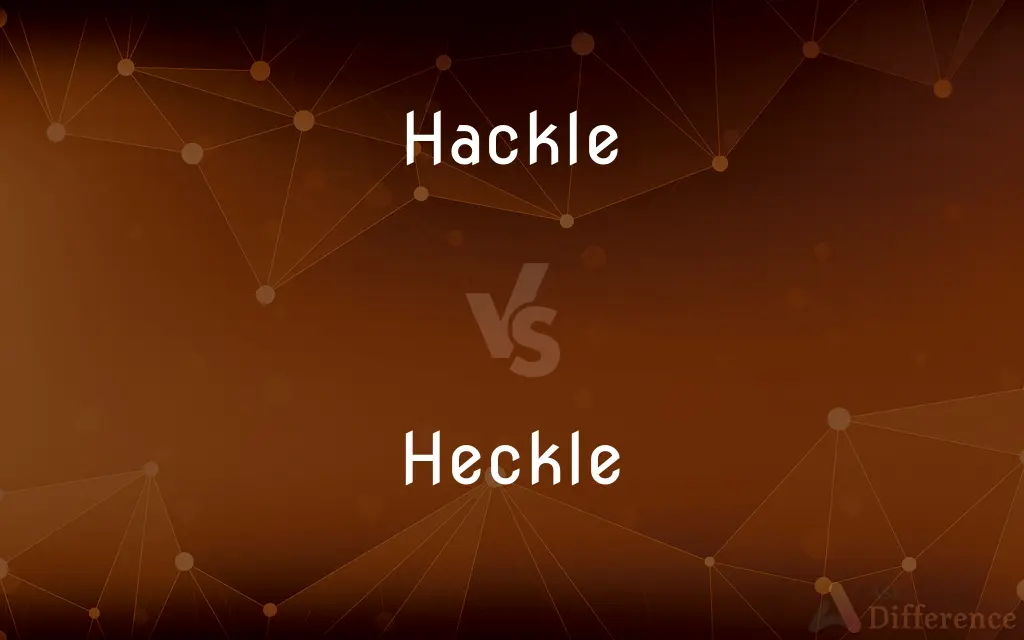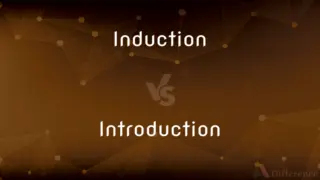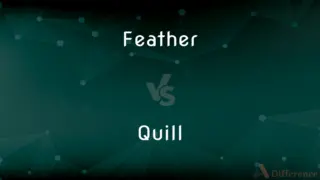Hackle vs. Heckle — What's the Difference?
By Tayyaba Rehman & Fiza Rafique — Updated on April 5, 2024
Hackle refers to the neck feathers of a bird or bristles on some animals, indicating agitation; heckle involves challenging or teasing someone, often in a public setting.

Difference Between Hackle and Heckle
Table of Contents
ADVERTISEMENT
Key Differences
Hackle is primarily used in the context of birds and certain animals, where it denotes the long, slender feathers located on the neck or the erectile hairs along the back of an animal, especially when they are raised in response to aggression or excitement. These physical responses are often indicators of the animal's emotional state, such as anger or fear. Whereas, heckle refers to the act of interrupting a speaker or performer with derisive or aggressive comments or questions. It is a form of interaction that can be confrontational and is commonly associated with audiences challenging or teasing performers, particularly in stand-up comedy or public speaking scenarios.
The term hackle has a specific application in the animal kingdom, serving as a visual cue to others about an animal's readiness to defend itself or its territory. The raising of hackles is a natural, instinctive reaction meant to make the animal appear larger and more intimidating to potential threats. On the other hand, heckling is a human behavior, rooted in the desire to interact with, disrupt, or challenge the person speaking or performing. While often negative in connotation, heckling can sometimes be playful or part of the expected interaction within certain contexts, like political gatherings or comedy clubs.
From a functional perspective, hackles play a role in animal communication, conveying emotional states without the need for sound or movement. This form of non-verbal communication is crucial in the animal world for avoiding unnecessary conflicts or for preparing for potential threats. Conversely, heckling is a form of verbal communication that involves direct speech. It requires both the heckler and the subject to understand the language and context of the exchange, making it a complex interaction that can have varied effects on the atmosphere and outcome of public events or performances.
In terms of human reactions and interpretations, observing an animal with raised hackles might provoke caution or awareness of the animal's agitated state among observers. This reaction can help prevent potential attacks or conflicts. In contrast, receiving heckles from an audience can challenge a speaker's or performer's ability to maintain composure and control over the situation. It tests their quick wit, resilience, and ability to engage with the audience under pressure.
Hackle and heckle also differ in their cultural and social implications. The physical response of raising hackles is universally recognized across different animal species as a sign of agitation or readiness to engage in defense. However, the act of heckling is deeply embedded in human culture and social norms, varying greatly in acceptance and practice across different societies and settings. In some cultures, heckling is seen as an integral part of the democratic process, allowing for direct, albeit confrontational, engagement with public figures.
ADVERTISEMENT
Comparison Chart
Definition
Long, slender feathers on the neck of birds or bristles on animals.
Interrupting a speaker with aggressive comments or questions.
Context
Animal kingdom, indicating emotional state.
Human interaction, particularly in public speaking or performances.
Communication Form
Non-verbal, physical response.
Verbal, direct speech.
Purpose
To appear larger and deter threats.
To challenge, tease, or disrupt the speaker or performance.
Cultural Aspect
Universal across species as a sign of agitation.
Varies by culture and setting, can be confrontational or playful.
Compare with Definitions
Hackle
Bristles on an animal's back that stand erect when threatened.
The dog's hackle lifted, signaling its readiness to attack.
Heckle
Teasing or challenging someone in a public setting.
Fans heckled the opposing team's goalkeeper throughout the match.
Hackle
Part of an animal's defense mechanism.
The raised hackle on the wolf made it appear larger to the opponent.
Heckle
To disrupt a speaker with challenging comments.
The comedian was heckled by someone in the crowd but handled it well.
Hackle
Long neck feathers of a bird, showing agitation.
The rooster's hackle rose as it confronted the intruder.
Heckle
Expressing dissent or seeking to disrupt through verbal jabs.
Activists heckled the corporate spokesperson during the presentation.
Hackle
Indicator of a bird or animal's emotional state.
Observing the cat's raised hackle, she knew to keep her distance.
Heckle
Engaging in verbal confrontation during performances.
He decided to heckle the politician during the rally.
Hackle
Reflects the instinctive reaction to threats in animals.
The sudden raise of the hackle was the bird's response to danger.
Heckle
A form of audience interaction, sometimes negative.
The speaker faced a tough crowd that loved to heckle.
Hackle
The hackle is a clipped feather plume that is attached to a military headdress. In the British Army and the armies of some Commonwealth countries, the hackle is worn by some infantry regiments, especially those designated as fusilier regiments and those with Scottish and Northern Irish origins.
Heckle
To try to embarrass and annoy (someone speaking or performing in public) by questions, gibes, or objections; badger.
Hackle
Any of the long, slender, often glossy feathers on the neck of a bird, especially a male fowl.
Heckle
To comb (flax or hemp) with a hatchel.
Hackle
Hackles The erectile hairs along the back of the neck of an animal, especially of a dog.
Heckle
(transitive) To question harshly in an attempt to find or reveal weaknesses.
Hackle
A feather, usually from the neck of a chicken, used in trimming a fishing fly.
Heckle
(transitive) To insult, tease, make fun of or badger, especially during a comedy performance.
Promise that you won't heckle me after my performance.
Hackle
To trim (an artificial fishing fly) with a hackle.
Heckle
(textiles) To prepare flax for spinning using special combs called hackles
Hackle
To chop roughly; mangle by hacking.
Heckle
The long shining feathers on a cock's neck.
Hackle
To hack.
Heckle
A feather ornament in the full-dress bonnets of Highland regiments.
Hackle
An instrument with steel pins used to comb out flax or hemp.
Heckle
An interruption during a show, especially a comedy performance
The stand-up dealt well with the heckles from the crowd, replying with raucous banter to raise plenty of laughs.
Hackle
One of the long, narrow feathers on the neck of birds, most noticeable on the rooster.
Heckle
Same as Hackle.
Hackle
(fishing) A feather used to make a fishing lure or a fishing lure incorporating a feather.
Heckle
To interrogate, or ply with questions, esp. with severity or antagonism, as a candidate for the ministry.
Robert bore heckling, however, with great patience and adroitness.
Hackle
By extension (because the hackles of a rooster are lifted when it is angry), the hair on the nape of the neck in dogs and other animals; also used figuratively for humans.
When the dog got angry, his hackles rose and he growled.
Heckle
To shout questions or jibes at (a public speaker), so as to disconcert him or render his talk ineffective.
Hackle
A type of jagged crack extending inwards from the broken surface of a fractured material.
Heckle
A comb for separating flax fibers
Hackle
A plate with rows of pointed needles used to blend or straighten hair.
Heckle
Comb with a heckle;
Heckle hemp or flax
Hackle
A feather plume on some soldier's uniforms, especially the hat or helmet.
Heckle
Challenge aggressively
Hackle
Any flimsy substance unspun, such as raw silk.
Hackle
To dress (flax or hemp) with a hackle; to prepare fibres of flax or hemp for spinning.
Hackle
(transitive) To separate, as the coarse part of flax or hemp from the fine, by drawing it through the teeth of a hackle or hatchel.
Hackle
To tear asunder; to break into pieces.
Hackle
A comb for dressing flax, raw silk, etc.; a hatchel.
Hackle
Any flimsy substance unspun, as raw silk.
Hackle
One of the peculiar, long, narrow feathers on the neck of fowls, most noticeable on the cock, - often used in making artificial flies; hence, any feather so used.
Hackle
An artificial fly for angling, made of feathers.
Hackle
To separate, as the coarse part of flax or hemp from the fine, by drawing it through the teeth of a hackle or hatchel.
Hackle
To tear asunder; to break in pieces.
The other divisions of the kingdom being hackled and torn to pieces.
Hackle
Long slender feather on the necks of e.g. turkeys and pheasants
Hackle
Comb with a heckle;
Heckle hemp or flax
Common Curiosities
What does hackle mean?
Hackle refers to the long feathers on the neck or bristles on the back of certain animals, often raised in response to threats or agitation.
Can hackles be raised intentionally by animals?
Animals raise their hackles instinctively as a defense mechanism, not through conscious effort.
Why do people heckle?
People heckle for various reasons, including expressing disagreement, attempting to disrupt, or engaging playfully with the speaker or performer.
How do performers deal with hecklers?
Performers deal with hecklers in various ways, including ignoring them, engaging with witty responses, or sometimes having them removed from the venue.
What’s the difference between hackle and heckle?
Hackle is a physical, non-verbal response in animals indicating agitation, while heckle is a verbal act of challenging or teasing someone, especially in public.
Is raising hackles voluntary for animals?
The raising of hackles is an involuntary, instinctive response to stimuli that indicates aggression or fear.
Is heckling always negative?
While heckling is often perceived negatively, in some contexts, it can be seen as part of the expected interaction or even as a form of engagement.
Is there a human equivalent to raising hackles?
Humans may not raise hackles, but physical responses to stress or anger, like goosebumps or flushing, can serve as a somewhat analogous reaction.
How do audiences perceive heckling?
Audiences can have mixed reactions to heckling, ranging from amusement to discomfort, depending on the context and nature of the heckling.
Can animals control their hackle response?
Animals cannot consciously control the raising of their hackles, as it is an automatic response to certain emotions or environmental factors.
What is heckling?
Heckling is the act of interrupting or challenging a speaker or performer with derisive or aggressive comments or questions.
Do all birds have hackles?
Most birds have feathers that could be termed hackles, especially around the neck area, but not all birds raise these feathers in the same way.
How does culture influence perceptions of heckling?
Cultural norms and values significantly influence how heckling is perceived and practiced, with some cultures viewing it as more acceptable or integral to public discourse than others.
Can heckling be constructive?
In rare cases, heckling can be constructive if it prompts meaningful dialogue or highlights important issues, but this is not the norm.
Why is heckling more common in certain settings?
Heckling is more common in settings where direct interaction with the audience is expected or where there are strong opinions, such as comedy clubs or political rallies.
Share Your Discovery

Previous Comparison
Induction vs. Introduction
Next Comparison
Feather vs. QuillAuthor Spotlight
Written by
Tayyaba RehmanTayyaba Rehman is a distinguished writer, currently serving as a primary contributor to askdifference.com. As a researcher in semantics and etymology, Tayyaba's passion for the complexity of languages and their distinctions has found a perfect home on the platform. Tayyaba delves into the intricacies of language, distinguishing between commonly confused words and phrases, thereby providing clarity for readers worldwide.
Co-written by
Fiza RafiqueFiza Rafique is a skilled content writer at AskDifference.com, where she meticulously refines and enhances written pieces. Drawing from her vast editorial expertise, Fiza ensures clarity, accuracy, and precision in every article. Passionate about language, she continually seeks to elevate the quality of content for readers worldwide.
















































